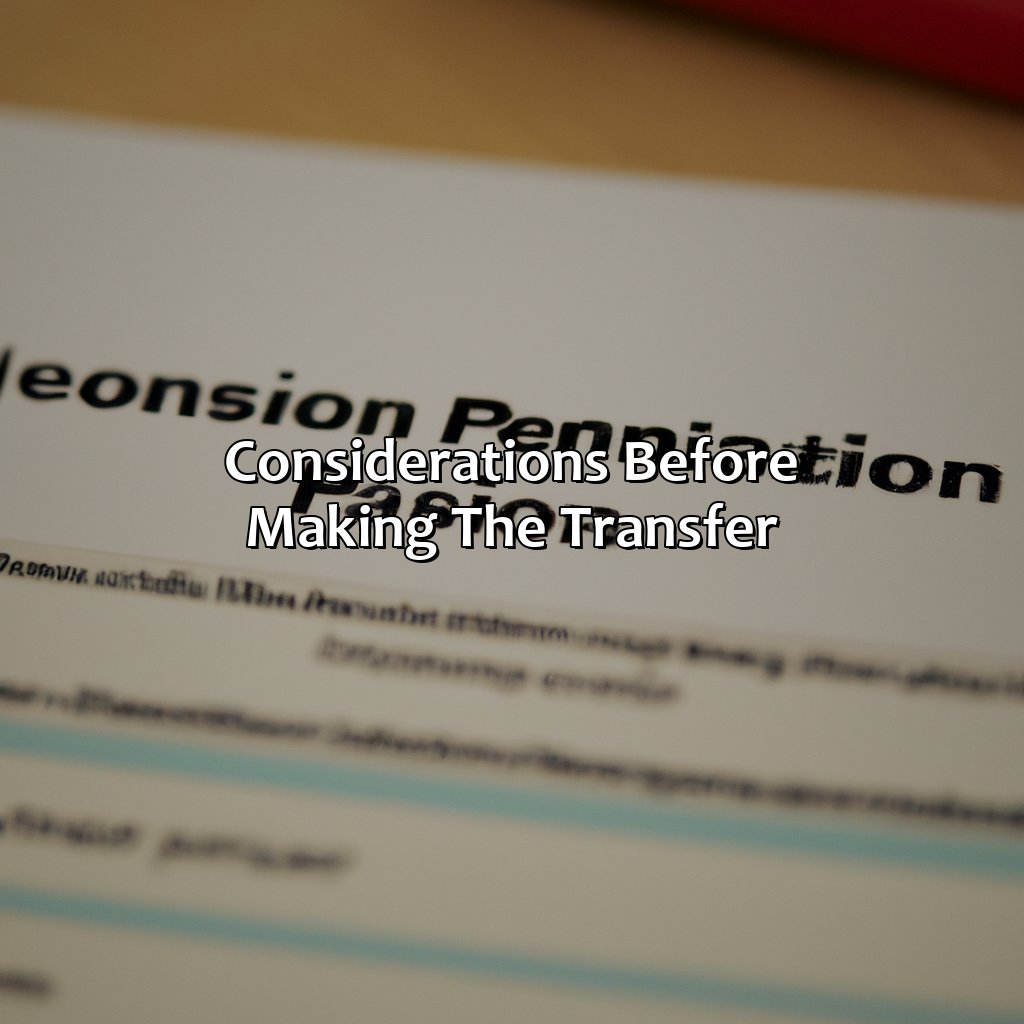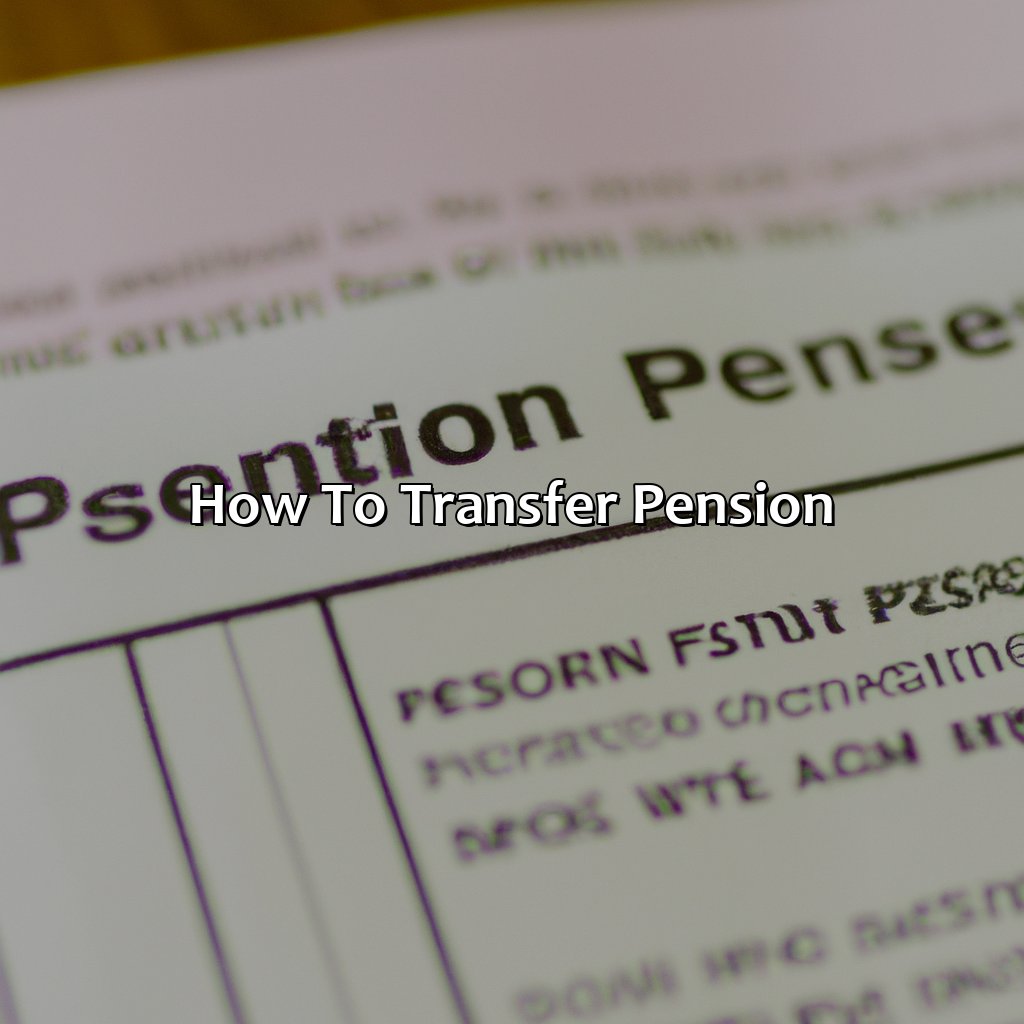How To Transfer Pension?
Key Takeaway:
- Transferring your pension can be a wise decision if you switch jobs, have better investment options, or retire abroad. It allows you to consolidate your retirement savings and potentially increase your returns.
- To transfer your pension, first gather information on your current pension plan. Then, research potential new pension providers and initiate the transfer process with the chosen provider.
- Before making the transfer, consider any fees and charges associated with the transfer, the tax implications, and the potential benefits of your new pension plan. It’s important to make sure the transfer aligns with your retirement goals and financial needs.
You worry about how to transfer your pension? You’re not alone. This article will provide a comprehensive guide to transferring your pension, detailing the steps involved and the implications of such a move. So, read on to explore the best options for your pension transfer.
Reasons for Pension Transfer
It’s wise to move your pension. Why? Here’s why: job switch, improved investment selections, and retiring in a foreign country. Each of these has situations where transferring your pension could improve your financial future.

Image credits: retiregenz.com by Joel Jones
Job Change
Changing employers can trigger a need for pension transfer to ensure that you continue to build up your retirement savings. To initiate this process, contact your pension provider and provide details of the new employer’s scheme. You may also seek advice from a financial advisor on whether a transfer is the best option.
When transferring your pension, it’s essential to evaluate if it fits with your retirement plan and compare fees between providers. Additionally, keep in mind that some providers charge exit fees or apply penalties when transferring the funds early.
If you decide to proceed with the pension transfer, request a written confirmation from both providers detailing the cost, time frame and other important information that affects the transfer process. This will help you avoid unwanted surprises during and after the transfer. You can also check out how to find out your pension before proceeding with the transfer.
Moving your pension can be beneficial in certain circumstances like consolidating old schemes or where your current provider offers limited investment options. However, ensure that you consider all pros and cons before making any final decisions about transferring pensions.
If your retirement plan involves hiding cash under your mattress, it may be time to explore better investment options.
Better Investment Options
For individuals looking to maximize their retirement income, exploring alternative investment options can prove to be a viable solution. Diversifying one’s portfolio and moving away from traditional investment strategies is becoming increasingly common in the pension transfer landscape. By doing so, retirees have the opportunity to explore new markets and gain access to potentially higher returns.
Options such as stocks and mutual funds can offer an attractive return on investment, but it s important to consider the risks associated with these investments before making any drastic changes. Prioritizing a comprehensive understanding of each option is the key to determining whether diversification is right for you.
It s essential to keep in mind that better investment options may not always yield constant or higher returns; a comprehensive understanding of risk and reward is therefore vital. Transactions made during invested years are usually irreversible unless frozen with specified penalties which make it a life-altering decision when it comes to long-term financial planning.
For example, some retired investors have turned towards investing in rental property as an alternate source of income during their golden years. While this may have worked for some individuals, it s important to note that owning rental property comes with its own set of risks such as tenant damage or vacancy rates lowering the overall value of properties.
However, it’s also important for retirees to understand what the asset test for the aged pension is and how transferring their pension may be beneficial for their financial situation.
Ultimately, exploring alternative investment options can prove beneficial if done wisely, but it’s crucial for retirees seeking pension transfers to consider all factors carefully before taking action based on short-term gains rather than long-term resultant impacts that might exist down the line.
If you’re planning on retiring abroad, just remember- pi a coladas are cheaper, but so is the healthcare.
Retirement Abroad
Retired life in a foreign land can be daunting and exciting. Many people are attracted to the idea of retiring abroad due to cultural experience, cost of living, and quality healthcare. However, if you’re planning for Retirement Abroad, transferring your pension may become complicated.
The rules around transferring pensions vary from country to country, and some countries may not have agreements with other countries for pension transfers. Pensioners should research the tax laws and regulations that apply to them before making any decisions. If you’re looking to roll over your pension to an IRA, it’s important to understand the process and requirements involved.
One aspect worth considering is the currency exchange rates as they could impact the value of your pension at the time of transfer. Additionally, many financial advisors recommend diversifying retirement income streams by investing in alternative assets such as real estate or cryptocurrency.
A British couple who decided to retire in Spain found it challenging when their UK pensions were subject to Spanish tax rates and restrictions on withdrawals. Employing a finance professional was essential for navigating these complexities. If you are wondering how to transfer your UK pension to Australia, it is highly recommended to seek the help of a pension transfer specialist who can guide you through the process.
From paperwork to phone calls, transferring your pension can make you feel like you’re heading straight into retirement without the fun parts.
Steps to Transfer Pension
- To transfer your pension to a different provider, you should get information about your present pension plan.
- Research potential new pension providers.
- Then, start the transfer process with the new provider.
These are the steps you should follow to transfer your pension to a different provider.

Image credits: retiregenz.com by James Duncun
Gather Information on Current Pension Plan
To initiate the process of transferring your pension, acquiring knowledge about your existing plan becomes pivotal. This would include comprehending the benefits and drawbacks associated with it. Gaining insight into your current pension scheme would enable you to make an informed decision about the transfer.
You must obtain information such as policy statements, payout options, vesting period, beneficiary designation, and purchase clauses. You can retrieve this information from your employer or pension provider. Understanding these factors will assist in determining whether it’s a reasonable option to continue with the current pension plan or opt for a pension transfer.
Before heading towards the next step of transferring your pension, ensure that you have understood all aspects of your existing scheme. Provide all essential details and comply with regulations while opting for a transfer. If you are wondering how do I claim my civil service pension, you can visit our website for more information.
In accordance with a report by PensionBee, around 19bn assets are left untouched due to customers failing to transfers their pensions to new providers. So, if you are wondering how do I check my pension, it’s important to take the necessary steps to transfer your pension to avoid losing out on potential earnings in the long run.
Better to research pension providers now than to be stuck with one as reliable as a broken elevator during a fire.
Research Potential New Pension Providers
When transferring pension, it is essential to find potential new providers. Researching the available options can help you find a provider that best suits your needs and offers better services than your current pension holder.
Begin by comparing the charges and fees of different providers, as this can affect your overall returns. Evaluate the investment opportunities offered and their performance in recent years. Also, consider providers policies on ethical investment. If you’re wondering how much do I pay into my pension, it’s best to consult with a financial advisor.
Additionally, ensure that potential providers match your desired retirement age and offer flexible options if you plan to retire earlier or later. Researching the customer service rating of various companies is also crucial.
It’s worth noting that according to The Pensions Regulator, you should only transfer your pension scheme if it will benefit you overall. Wondering how to get a pension? Here’s a comprehensive guide that can help you!
A survey conducted in 2020 showed that seventy-five percent of people transferring pensions did not seek financial advice before doing so.
Ready to break up with your old pension provider? Just remember, it’s not them, it’s you (and your need for better options).
Initiate Transfer Process with New Provider
To initiate the commencement of pension transfer with a new provider, you must follow certain steps.
- Submit request to previous provider: The first step is to inform your existing pension provider about your intention to transfer and request for a cash equivalent transfer value (CETV).
- Select new provider: Research and select a new pension provider and provide them with necessary details like the amount of CETV and other relevant documentation.
- Complete Transfer Process: The final step is for the new pension provider to complete the required administrative procedures within an acceptable timeframe.
It is important to note that pensions are long-term investments that can vary in complexity, so ensure that you consider all your options before proceeding with the process.
Pro Tip: Seek professional advice from an independent financial advisor before making any decisions concerning transferring your pension.
Before you transfer your pension, make sure you’re not just jumping out of the frying pan and into the fire.
Considerations Before Making the Transfer
Before transferring your pension, there are key considerations to be aware of. These include fees, charges, tax implications and benefits. To find the answers to these questions and understand the pros and cons of transferring your pension, read on!

Image credits: retiregenz.com by Joel Arnold
Fees and Charges
The costs associated with transferring a pension require careful consideration before making any decisions. Here is everything you need to know about the financial implications of such a move.
| Types of Fees and Charges | What they cover |
|---|---|
| Transfer Fee | Cost associated with moving your pension fund to a new provider |
| Exit Penalty | A fee imposed by your current provider when leaving their scheme before the agreed-upon date |
| Investment Charges | The ongoing cost of managing your investments, including administration and transaction fees |
It’s important to note that not all pension providers will charge identical fees and charges, so it’s crucial to compare options thoroughly to ensure you’re getting the best deal possible.
If you’re considering transferring your pension early, be aware that exit penalties may apply. Additionally, if you transfer when markets are low, you may miss out on potential returns while waiting for the market to recover.
Did you know that a recent study found 9 in 10 people don’t understand their pension fees? Make sure to ask every detail before making any moves for an informed decision-making process.
Nothing like a little tax pain to remind you that transferring your pension isn’t all rainbows and unicorns.
Tax Implications
When transferring a pension, there are important tax implications that must be considered. It’s crucial to understand the impact of transferring a pension on both income tax and capital gains tax. In doing so, you can make informed decisions and avoid unexpected costs. Additionally, it’s essential to consider the consequences of exceeding annual allowances, such as the lifetime allowance and annual contribution limit.
It’s worth noting that choosing between a defined benefit or defined contribution scheme could affect your tax situation. For instance, if you decide to transfer from a defined benefit scheme to a personal pension plan, your annual allowance could be affected. Furthermore, if you exceed your lifetime allowance limit upon transferring, heavy taxes may apply.
An interesting piece of history about this topic is that in 2015, the UK government introduced new legislation allowing individuals greater freedom when transferring their pensions. This increased flexibility led to more people considering transferring their pensions but also raised concerns about unforeseen tax implications. As such, it became even more essential for individuals to seek professional advice before making any pension transfers.
Why wait for retirement to start feeling like a burden? Let transferring your pension benefits do the job for you.
Pension Benefits
Pension plans are a vital source of financial security during retirement. Here are some pertinent details regarding these retirements schemes to help you make an informed decision.
Benefits
- Wealth accumulation: Pension schemes harness the power of compound interest to build up wealth gradually.
- Tax advantages: By investing in the right pension plan, you can reduce your overall tax burden and enjoy higher returns on your investment.
- Flexibility: Modern pension plans offer flexibility in terms of contributions, withdrawals, and risk management.
Moreover, pension benefits differ from one scheme to another based on their tenure, type, and fund management style.
If you’re unsure whether to transfer your existing pension scheme or not, consult with a professional planner first. They can offer valuable insights into the pros and cons of switching to a new plan.
A colleague of mine was once stuck with an under-performing pension scheme that wasn’t growing at all. Based on recommendations from her financial advisor, she switched to a different plan and started experiencing significant growth almost immediately. The morale here is this: make sure you do your research before making any decisions about transferring pension schemes.
5 Well-Known Facts About How To Transfer Pension:
- ✅ A pension transfer may be beneficial if your current plan has high fees or limited investment options. (Source: The Balance)
- ✅ Different pension plans may have different transfer rules and fees, so it’s essential to research and compare options carefully. (Source: Money Advice Service)
- ✅ It’s important to be mindful of the potential tax implications of transferring your pension, such as incurring an early withdrawal penalty. (Source: GOV.UK)
- ✅ If you’re transferring a defined benefit pension plan, you may lose valuable benefits, such as a guaranteed income. (Source: Money Saving Expert)
- ✅ Working with a financial advisor can help you navigate the complex process of transferring your pension and make informed decisions. (Source: Forbes)
FAQs about How To Transfer Pension?
What is a pension transfer?
A pension transfer refers to the process of moving your pension savings from one provider to another. This can be done for a variety of reasons, such as seeking a better return on investment, consolidating multiple pensions into one, or accessing more flexible retirement options.
How can I transfer my pension?
To transfer your pension, you will need to contact your current provider and your new provider. Your current provider will provide you with a transfer value, which is the amount you will receive if you decide to transfer. Make sure to compare the costs and benefits of both providers before making a decision.
What are the benefits of transferring my pension?
Transferring your pension can provide various benefits, such as consolidating multiple pensions into one for easier management, choosing a provider with better investment options and fees, or accessing more flexible retirement options, such as drawdown.
What are the risks of transferring my pension?
Transferring your pension comes with risks, such as losing valuable benefits, paying transfer fees, or transferring to a less reputable provider. Before transferring, make sure to consider the costs and benefits, and seek professional financial advice if needed.
What happens to my pension if I move abroad?
If you move abroad, you can still transfer your pension to a provider in your new country of residence. However, you will need to consider the tax obligations and regulations of both your home country and your new country before making any decisions.
Is there a deadline for transferring my pension?
There is no deadline for transferring your pension, but it is recommended to start the process at least a few months before your planned retirement date. This will allow enough time for the transfer to be completed and for any potential issues to be resolved.
